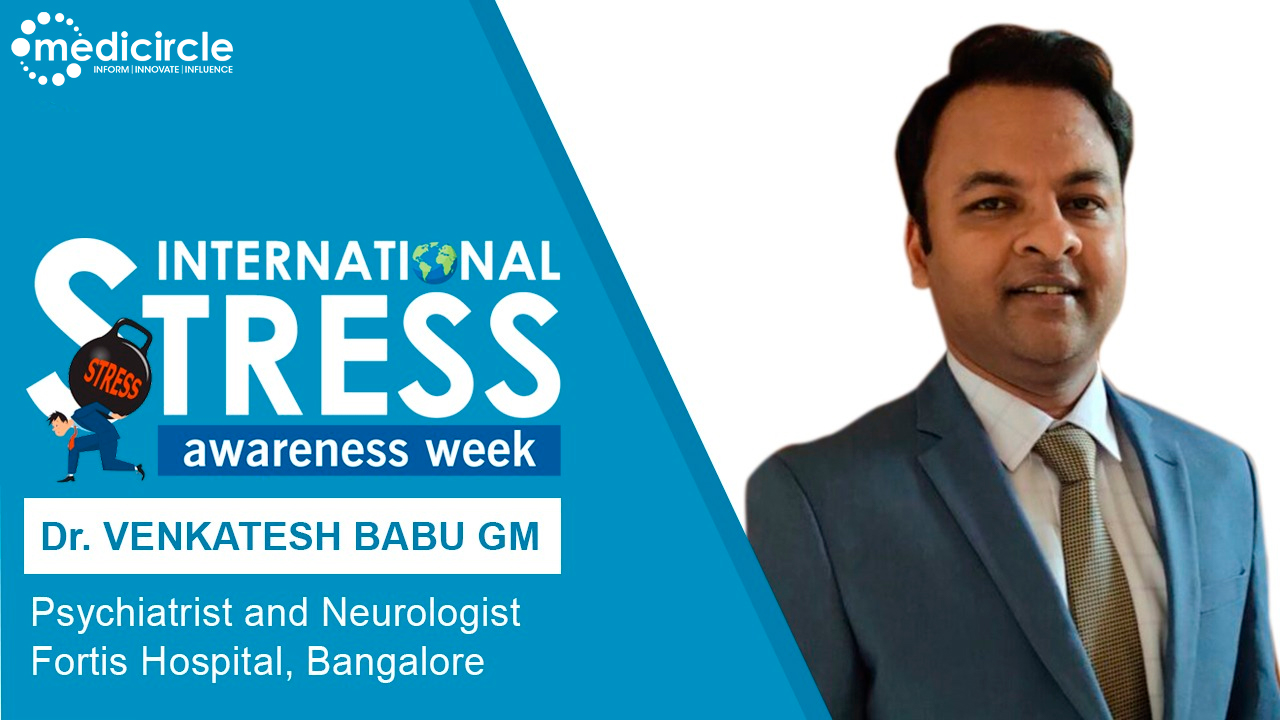International Stress Awareness Week is celebrated every first week in the month of November to raise awareness of the challenges and burdens associated with dealing with stress daily. The day was launched by the International Stress Management Association. Many people across the world have gone through tough times due to the COVID-19 outbreak.
Even before the pandemic, India was labeled as the most stressed country. Where the global average of stress is 86%, 89% of Indians suffered from stress in 2019. That is 9 in every 10 people suffer from stress.
On the occasion of International Stress Awareness Week, we at Medicircle are conducting an exclusive awareness series wherein we will be featuring experts in this field to understand and create more awareness about the effects of stress.
Dr. Venkatesh Babu G M is currently working at Fortis Hospital and Bangalore. He is an internationally trained mental health professional working in the field of psychiatry and neurology, practicing behavioral medicine with a keen interest in understanding illnesses of the brain from the neuropsychiatric and psycho-social perspectives by analyzing the human behaviors and dealing with them holistically by pharmacological, psychotherapeutic and newer brain stimulation treatment approaches. He does possess hands-on skills in the areas of Brain Stimulation, Clinical Research, Electrophysiology, Schizophrenia, Depression, Social Psychology, Anxiety Disorders, etc.
Understand causes of stress
Dr. Venkatesh Babu informs, “It is important to understand the causes of stress. There is no universal definition of stress and one needs to understand the causes of stress. Psychological stress is an event of stress that occurs at a particular time and stage in a particular person. Stress is subjective and different for each and every person. It is important to identify stress to understand the problem. There are many types of stress which are as follows-
Positive stress like exam stress which is an activity to prepare and skill up to improve life skills. This is good stress. Just like an example of sports activities to win. Negative stress- like job stress on getting a new job. One needs to get expertise and practical reality. When it is expected and practical difference, this leads to an interpersonal deficit which leads to the origin of stress. This is distress .”
The right time for Professional help for stress
Dr. Venkatesh Babu informs, “The best way to take professional help for stress is as follows -
Identify stress and mental problem at an early stage
Understanding mental stress
Emotional distress is important to feel rather than comprehend
Experiencing mental stress is important
Do not neglect mental stress
Avoid denial.”
Red flag signs for mental stress
Dr. Venkatesh Babu informs, “The symptoms of mental stress are -
Physical symptoms like sleeplessness, pain in the body, fatigue, bodily complaints like weight gain or loss Cognitive symptoms addicting thinking style, Crowded thoughts, low self-esteem Emotional symptoms like fear, anxiety, crying, fighting, irritability.
These represent psychosocial factors. If you are having these symptoms for 1 week or 2 weeks then you need professional help. If mental stress is persistent and present for a specified duration then you need professional help.”
Treatment for mental stress
Dr. Venkatesh Babu informs, “Understanding physical and mental health is important. The doctor or medical expert checks the biological disturbance for physical health. Whereas stress is identified to check physical and mental health. All the factors are taken into consideration -
Physical factors like biological factors - Medications are used for the same.
Psychosocial factors - Counselling can help with psychotherapy sessions.
Behavioral factors
Relation factors.”
Lifestyle habits for stress
Dr. Venkatesh Babu informs, “Pandemic has given us the experience to deal with stress in this covid. People are more open to mental health conversations. The lifestyle habits to release stress are as follows-
Good sleep Good hydration Good diet Physical regime Psychological regime Yoga or exercise Practice “me time” Mindfulness Invest in family time The creative healthy atmosphere at home Efficient communication style An open mind to say and listen
These factors are important for maintaining healthy mental balance and not to treat illness.”
(Edited by Dr. Rati Parwani)

 Dr. Venkatesh Babu informs that practicing ME time and mindfulness can help in relieving stress but not curing mental illness. He also informs us with his valuable expertise to know the correct time to visit a professional doctor if you are a victim of chronic stress who will guide you the right way to deal with mental stress.
Dr. Venkatesh Babu informs that practicing ME time and mindfulness can help in relieving stress but not curing mental illness. He also informs us with his valuable expertise to know the correct time to visit a professional doctor if you are a victim of chronic stress who will guide you the right way to deal with mental stress.




















.jpeg)










